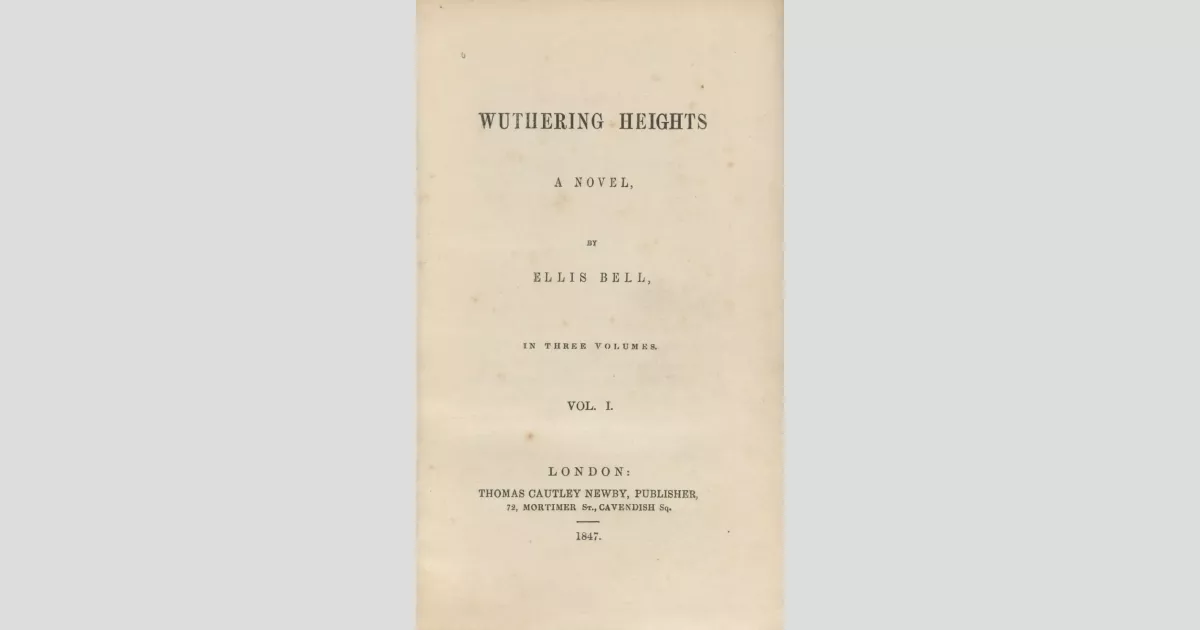Wuthering Heights, by Emily Brontë (as Ellis Bell), centers on the intertwined lives of the Earnshaw and Linton families on the Yorkshire moors and their complex relationship with Heathcliff, an orphan taken in by the Earnshaws. Heathcliff's passionate love for Catherine Earnshaw and his subsequent rejection fuels his lifelong quest for revenge against those he perceives as responsible, leading to destructive consequences for multiple generations. The novel explores themes of love, revenge, social class, and the impact of environment on character, using a non-linear narrative structure and gothic elements.
1916: John Cowper Powys Referenced Emily Brontë's Vision
In 1916, John Cowper Powys referred to Emily Brontë's "tremendous vision".
1920: Earliest film adaptation of Wuthering Heights directed by A. V. Bramble
In 1920, the earliest known film adaptation of Wuthering Heights was filmed in England and was directed by A. V. Bramble. It is unknown if any prints still exist.
1925: Virginia Woolf affirmed the greatness of Wuthering Heights
In 1925, Modernist novelist Virginia Woolf affirmed the greatness of "Wuthering Heights".
1926: Charles Percy Sanger's work on the chronology of Wuthering Heights
In 1926, Charles Percy Sanger's work affirmed Emily's literary craft and meticulous planning of the novel Wuthering Heights, disproving Charlotte's presentation of her sister as an unconscious artist.
1934: Lord David Cecil commented on Emily Brontë's appreciation
In 1934, Lord David Cecil commented in Early Victorian Novelists "that Emily Brontë was not properly appreciated; even her admirers saw her as an 'unequal genius'"
1934: Lord David Cecil drew attention to the contrast between the two main settings in Wuthering Heights
In 1934, Lord David Cecil in Early Victorian Novelists drew attention to the contrast between the two main settings in Wuthering Heights.
1939: Wuthering Heights film starring Laurence Olivier and Merle Oberon directed by William Wyler
In 1939, the film 'Wuthering Heights', starring Laurence Olivier and Merle Oberon and directed by William Wyler, was released. It won the 1939 New York Film Critics Circle Award for Best Film and was nominated for the 1939 Academy Award for Best Picture.
1948: F. R. Leavis excluded Wuthering Heights from the great tradition of the English novel
In 1948 F. R. Leavis excluded Wuthering Heights from the great tradition of the English novel because it was "a 'kind of sport'—an anomaly with 'some influence of an essentially undetectable kind.'"
1949: Simone de Beauvoir suggests that when Catherine says "I am Heathcliff": her own world collapse(s) in contingence
In 1949, Simone de Beauvoir, in her famous feminist work The Second Sex, suggests that when Catherine says "I am Heathcliff": "her own world collapse(s) in contingence, for she really lives in his."
1953: Nigel Kneale's script was produced for BBC Television
In 1953, Nigel Kneale's script was produced for BBC Television, starring Richard Todd as Heathcliff and Yvonne Mitchell as Cathy. Broadcast live, no recordings of the production are known to exist.
1954: Walter Allen spoke of the two houses in the novel as symbolising two opposed principles
In 1954, Walter Allen, in The English Novel, spoke of the two houses in the novel as symbolising 'two opposed principles which ... ultimately compose a harmony'.
1954: Release of Abismos de pasión directed by Luis Buñuel
In 1954, the adaptation, retitled Abismos de pasión, directed by Spanish filmmaker Luis Buñuel and set in Catholic Mexico, was released.
1958: CBS television adaptation of Wuthering Heights
In 1958, an adaptation of Wuthering Heights aired on CBS television as part of the series DuPont Show of the Month starring Rosemary Harris as Cathy and Richard Burton as Heathcliff.
1959: Australian television adaptation of Nigel Kneale's script
In 1959, Nigel Kneale's script was also adapted for Australian television during a time when original drama productions in the country were rare. Broadcast live from Sydney, the performance was telerecorded, although it is unknown if this kinescope still exists.
1962: BBC Television adaptation of Nigel Kneale's script
In 1962, there was a BBC Television adaptation using Nigel Kneale's script, starring Claire Bloom as Catherine and Keith Michell as Heathcliff. This production does exist with the BFI, but has been withheld from public viewing.
1964: First broadcast of Les Hauts de Hurlevent
In 1964, the first episode of the French mini-series Les Hauts de Hurlevent was broadcast.
1965: David Daiches referred to Cecil's interpretation as being persuasively argued though not fully acceptable
In 1965, David Daiches, in the Penguin English Library edition referred to Cecil's interpretation as being 'persuasively argued' though not fully acceptable
1966: Release of Hindi film Dil Diya Dard Liya
In 1966, the Hindi film Dil Diya Dard Liya, directed by Abdul Rashid Kardar and Dilip Kumar, based upon the novel Wuthering Heights, was released.
1967: BBC produced a four-part television dramatisation
In 1967, the BBC produced a four-part television dramatisation starring Ian McShane and Angela Scoular.
1968: Last broadcast of Les Hauts de Hurlevent
In 1968, the last episode of the French mini-series Les Hauts de Hurlevent was broadcast.
1970: Release of Wuthering Heights film starring Timothy Dalton
In 1970, the film 'Wuthering Heights' with Timothy Dalton as Heathcliff was released. It is the first colour version of the novel.
1971: Daphne du Maurier Argued the Status of Wuthering Heights
In 1971, the novelist Daphne du Maurier argued the status of Wuthering Heights as a "supreme romantic novel".
1975: Terry Eagleton explores the power relationships
In 1975, Terry Eagleton, in Myths of Power: A Marxist Study of the Brontës, further explores the power relationships between "the landed gentry and aristocracy, the traditional power-holders, and the capitalist, industrial middle classes".
1976: Genesis Album Wind & Wuthering
In 1976, English rock band Genesis released "Wind & Wuthering", an album alluding to the Brontë novel with its title and track titles like "Unquiet Slumbers for the Sleepers..." and "...In That Quiet Earth".
1977: Thomas John Winnifrith argues that the allusions to Heaven and Hell are more than metaphors
In 1977, Thomas John Winnifrith, author of The Brontes and Their Background: Romance and Reality, argues that the allusions to Heaven and Hell are more than metaphors, and have a religious significance.
1978: BBC produced a five-part TV serialisation of Wuthering Heights
In 1978, the BBC produced a five-part TV serialisation of Wuthering Heights starring Ken Hutchinson, Kay Adshead and John Duttine, with music by Carl Davis; it is considered one of the most faithful adaptations of Emily Brontë's story.
1980: Pat Benatar Covers "Wuthering Heights"
In 1980, Pat Benatar covered Kate Bush's song "Wuthering Heights" on her album Crimes of Passion.
1985: Release of the French film adaptation Hurlevent
In 1985, the French film adaptation 'Hurlevent' by Jacques Rivette was released.
1988: Yoshishige Yoshida's adaptation of Wuthering Heights set in medieval Japan
In 1988, Yoshishige Yoshida's adaptation of Wuthering Heights, with a transposed setting to medieval Japan, was released.
1988: Release of the Japanese film adaptation of Wuthering Heights
In 1988, the Japanese film adaptation of Wuthering Heights by Yoshishige Yoshida was released.
1989: "It's All Coming Back to Me Now" Inspired by Wuthering Heights
In 1989, Jim Steinman wrote the song "It's All Coming Back to Me Now" under the influence of Wuthering Heights, describing it as being about "being enslaved and obsessed by love".
1991: Release of the Filipino film adaptation Hihintayin Kita sa Langit
In 1991, Filipino director Carlos Siguion-Reyna made a film adaptation titled Hihintayin Kita sa Langit starring Richard Gomez as Gabriel (Heathcliff) and Dawn Zulueta as Carmina (Catherine).
1992: Release of Emily Brontë's Wuthering Heights film starring Ralph Fiennes and Juliette Binoche
In 1992, the film 'Emily Brontë's Wuthering Heights' starring Ralph Fiennes and Juliette Binoche was released.
1993: Angra Releases Cover of "Wuthering Heights"
In 1993, Brazilian heavy metal band Angra released a version of Kate Bush's song "Wuthering Heights" on its debut album Angels Cry.
1995: Windward Heights Reworking
In 1995, Maryse Condé's Windward Heights (La migration des coeurs) which is a reworking of Wuthering Heights set in Cuba and Guadeloupe at the turn of the 20th century was released. Condé stated she intended it as an homage to Brontë.
2000: Release of Hindi film Dhadkan
In 2000, the Hindi film Dhadkan, directed by Dharmesh Darshan, also based upon this novel, was released.
2002: Mizumura Minae's A True Novel inspired by Wuthering Heights
In 2002, Mizumura Minae's A True Novel (Honkaku shosetsu) was published and is inspired by Wuthering Heights.
2002: The Oxford Companion to English Literature states that the ending of the novel points to a union of the two contrasting worlds
In 2002, The entry on Wuthering Heights in the Oxford Companion to English Literature, states that "the ending of the novel points to a union of 'the two contrasting worlds and moral orders represented by the Heights and the Grange'".
2003: MTV produced a poorly reviewed version of Wuthering Heights
In 2003, MTV produced a poorly reviewed version of Wuthering Heights set in a modern California high school.
2003: Robert McCrum placed Wuthering Heights in his list of 100 greatest novels of all time
In 2003, writer and editor Robert McCrum placed Wuthering Heights in his list of 100 greatest novels of all time in The Guardian.
2007: Wuthering Heights as the greatest love story of all time
In 2007, a British poll presented Wuthering Heights as the greatest love story of all time. However, some of the novel's admirers consider it not a love story at all but an exploration of evil and abuse".
2008: "Cath..." by Death Cab for Cutie
In 2008, indie rock band Death Cab for Cutie released the song "Cath...", which was inspired by Wuthering Heights.
2009: ITV's two-part drama series of Wuthering Heights
In 2009, ITV released a two-part drama series of Wuthering Heights starring Tom Hardy, Charlotte Riley, Sarah Lancashire, and Andrew Lincoln.
2011: Graphic Novel Version Published
In 2011, Classical Comics published a graphic novel version of Wuthering Heights. Adapted by Sean Michael Wilson and illustrated by John M. Burns, it was later shortlisted for the Stan Lee Excelsior Awards.
2011: Release of the Wuthering Heights film starring Kaya Scodelario and James Howson
In 2011, the film 'Wuthering Heights' starring Kaya Scodelario and James Howson and directed by Andrea Arnold was released.
2013: Hilary Scharper's ecogothic novel Perdita was influenced by Wuthering Heights
In 2013, Canadian author Hilary Scharper's ecogothic novel Perdita was deeply influenced by Wuthering Heights, namely in terms of the narrative role of powerful, cruel and desolate landscapes.
2015: Jane Ciabattari polled 82 book critics and presented Wuthering Heights as number 7
In 2015, author and book reviewer Jane Ciabattari polled 82 book critics from outside the UK and presented Wuthering Heights as number 7 in the resulting list of 100 greatest British novels in BBC Culture.
2015: Premiere of Wuthering High on Lifetime
In 2015, the TV Movie Wuthering High, was shown on Lifetime and is set in Malibu, California.
2015: Robert McCrum placed Wuthering Heights in his list of 100 best novels written in English
In 2015, writer and editor Robert McCrum placed Wuthering Heights in his list of 100 best novels written in English.
2017: The poem "Wuthering" by Tanya Grae uses Wuthering Heights as an allegory
In 2017, the poem "Wuthering" by Tanya Grae uses Wuthering Heights as an allegory.
2018: Jimmy Urine Cover of "Wuthering Heights"
In 2018, Jimmy Urine released a cover of Kate Bush's "Wuthering Heights" adding electropunk elements.
2018: Publication of Michael Stewart's Ill Will
In 2018, Michael Stewart's novel 'Ill Will' was published, a first-person narrative of Heathcliff's missing years from 1780.
2018: Penguin presented a list of 100 must-read classic books and placed Wuthering Heights at number 71
In 2018, Penguin presented a list of 100 must-read classic books and placed Wuthering Heights at number 71, saying: "Widely considered a staple of Gothic fiction and the English literary canon, this book has gone on to inspire many generations of writers – and will continue to do so".
2019: Publication of Valerie Browne Lester's The West Indian
In 2019, Valerie Browne Lester's novel, The West Indian, was published which imagines an origin story for Heathcliff in 1760s Jamaica.
2021: Emma Rice directed a theatrical version
In 2021, Emma Rice directed a theatrical version that was shown online and at the Bristol Old Vic.
2021: Release of K-Ming Chang's Bone House
In 2021, K-Ming Chang's chapbook Bone House was released by Bull City Press. The collection functions as a queer Taiwanese-American retelling of Wuthering Heights.
2022: Emma Mackey starred in a biopic of Emily Brontë in Emily
In 2022, Emma Mackey starred in a biopic of Emily Brontë in Emily. The film charts the life of Brontë and the inspiration she gained for writing Wuthering Heights living in the Yorkshire countryside.
2022: Theatrical version put on at the National Theatre
In 2022, the theatrical version directed by Emma Rice was put on at the National Theatre.
July 2024: Emerald Fennell to direct and write a new film adaptation
In July 2024, it was announced that Emerald Fennell was set to direct and write a new film adaptation of Wuthering Heights for Warner Bros..
2024: Mili Releases "Through Patches of Violet"
In 2024, the indie band Mili released a single "Through Patches of Violet" for the game "Limbus Company", featuring themes of poorly communicated love inspired by Wuthering Heights. The song is sung by Cassie Wei.
February 2026: Release of the new film adaptation
In February 2026, the new film adaptation of Wuthering Heights is set to be released in theatres. Starring Margot Robbie as Catherine Earnshaw, and Jacob Elordi as Heathcliff.
Mentioned in this timeline
CBS Broadcasting Inc CBS is a prominent American commercial broadcast...
California is a U S state on the Pacific Coast...
The Guardian is a British daily newspaper founded in as...
Japan is an East Asian island country situated in the...
Australia officially the Commonwealth of Australia encompasses the Australian mainland...
Virginia officially the Commonwealth of Virginia is a state located...
Trending

3 months ago Jannik Sinner Dominates, Reaches Paris Masters Final, Eyes No. 1 Ranking Return

3 months ago Ben Shelton faces Kamil Majchrzak at ATP Basel after Rune's setback: Predictions.

6 months ago Ryan Reynolds Hints at Deadpool Joining Avengers in Cryptic Instagram Post
8 months ago Chiefs Dominate 2025 NFL Schedule with Seven Prime-Time Games

3 months ago Kendall Jenner Celebrates Her 30th Birthday with Nude Beach Photos and Bikini Looks
11 months ago Latvia Imposes Entry Ban on Citizens from Russia and Belarus Amid Tensions
Popular

Thomas Douglas Homan is an American law enforcement officer who...

William Franklin Graham III commonly known as Franklin Graham is...

Jupiter is the fifth and largest planet from the Sun...

XXXTentacion born Jahseh Dwayne Ricardo Onfroy was a controversial yet...

Instagram is a photo and video-sharing social networking service owned...

Kristi Noem is an American politician who has served as...
